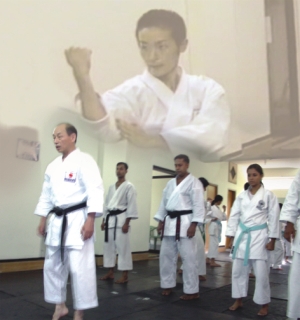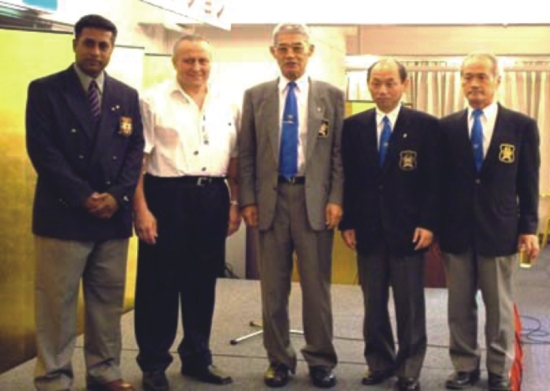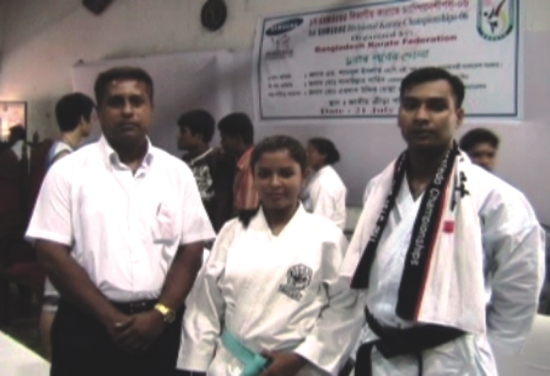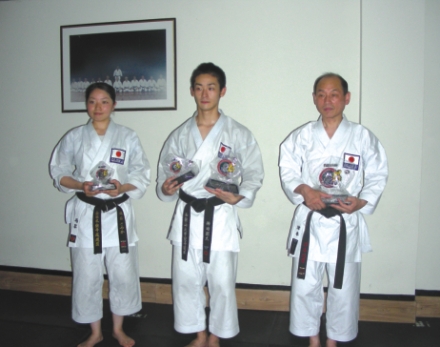|
Endeavour Karate Unleashed
Imran H. Khan
Karate or karate-dô is an ancient martial art of Okinawa and Japanese origin. The original meaning of karate was Tang hand, namely Chinese hand, which changed its meaning to 'empty hand' in Japanese. The main principle of karate is self-defense. It is said there is no first attack in karate, and that is true, all training is based on defense of one's self and defense of another. When this art found its way into Bangladesh, the principle was slightly deviated. Some people joined to keep themselves healthy, some to learn discipline and others, to break their enemy's kneecap. Whatever the reason, this ancient art has fascinated us all at one time or another. Karate took roots in Bangladesh during the mid seventies. It was a Bruce Lee era and everyone was into karate and kung-fu movies. The moves and the mood of the young fighters captured the appeal of numerous action lovers, one of whom was Imran Rahman. Everyone wanted to follow in the footsteps of Lee, or rather do a 360 degree round-house kick like him. “This was my motivation at first,” says Rahman but after years of practice his motivation has taken new roots, namely in the form of champion martial arts students.
 A practice session in progress with Grand Master Nobutaka Tsumoto taking the helm |
Imran started practicing karate in 1976 under Monjur Morshed, the first Grand Master of Karate in Bangladesh. This was a time when karate didn't have any style or grammar; it was all just kicking and punching. “The only place we got to learn this art was from the television, books and magazines,” recalls Rahman. Six years down the line, in 1983, he took part in the First National Karate Championship in Bangladesh and won the gold medal there. Imran Rahman was named the first National Karate Champion. The next year, he repeated the feat. By the end of 1984, Rahman was totally motivated to take his practice to the next step. He went to Germany and stayed there for three years to learn the grammar of karate. He then came back to Bangladesh a sensei and started to teach his learning.
In 1988, there was the Mohamadan AB League Karate tournament; sensei Imran's team the then Old Dohs Karate Boys Club won the top prizes. The heroes of that time were Selim, Solaiman, Heron, Hossain Ali, Liton, Kemal, Tariq, Shofiqul, all national champions in different categories. Inspired by their achievement, Rahman wanted to develop this art more and so the school started to take in more students. It was at that time when Parvez, one of the shining stars came into the picture. Mir Md. Ebne Iftekhar Hossain (Parvez) showed true dedication and practiced hard. His efforts reaped quick results when in 1991, in the Dhaka Mohanogor Karate League, he won two gold medals. Other students of Imran also bagged top honours and the league was won by the Dohs Club. Parvez got into karate because he wanted to be a sportsman. There may be a lot of coaches but everyone knows the sportsman. “I knew that in order to be known, I had to become the Champion,” says the 32 year-old Parvez. “Karate has changed my life. I have developed my fitness and I am maintaining a discipline. I am happily married with one daughter. I am as content as can be.”
In the year 1991, Parvez became the karate league champion and joined the Bangladesh Ansar and Village Defense Party (VDP) team. He then went on to become the Bangladesh National Karate Champion from 1991 to 2001, a spectacular eleven year run. Since 2001, he has also been assigned as an Assistant Coach to Bangladesh Ansar. After a gap, from 2003 to this very day, he has been the divisional champion and his triumph continues. “I am the only student who has 54 gold medals, 3 silver and 1 bronze,” says Parvez. “No one has beaten that record here in Bangladesh yet.” After Parvez's amazing run as a champion, Imran Rahman was sought to be the best teacher in Bangladesh. Other students too have endless acclaim to their name. Hossain Ali a senior student of Rahman's has 35 gold, 6 silver and 2 bronze medals. Md. Shawkat Hossain Liton has 10 gold, 1 silver and 5 bronze to his name. Liton was also the South Asian Champion in the year 1994 along side Parvez. He also took part in one of the All Japan Karate Competition and came in 3rd.
Parvez and Hossain Ali, another senior student played the first world cup for Bangladesh in 1996 in South Africa in the Karate World Championship. “I lost in the 3rd round to the then three times World Champion Steve Guel, from Great Britain. He was the student of Tricky Donabon, one of the greatest karate teachers of all time,” says Parvez, recalling one of his greatest fights. Steve Guel went on to become the champion that year too.
In 2001, Old Dohs Karate Boys Club invited Grand Master Kumer Stanko (5th Dan) to Bangladesh. Stanko was the trainer who had taught Imran the grammar of karate in Germany. He was also the President and Chief Instructor of the German JKF Goju kai Federation and German Kenbukan Federation. When he saw Rahman and his student's performance, he was highly impressed and recommended the group to the Japan Karate Federation (JKF) - Gojo kai. After reviewing numerous photos, certificates and videos sent to them, based on Imran Rahman's performance, the JKF made him a member of their organisation. Rahman was the first ever Bangladeshi to become a member of JKF and to this day, no other sensei has received such a membership or honour. The name of the karate club was soon changed to Bangladesh Gojo-kai Karate Club.

Imran Rahman (extreme left), Kumer Stanko, Kishi and Nobutaka Tsumoto, all teachers of the JKF Kenbukan school and Maekawam Relations officer of JKF in August 2004
“In 2002, we all became the members of JKF through sensei Imran,” says Parvez, now a 3rd Dan. JKF recognised that most of the Rahman's students who were winning top honours and they wanted to help these students move further. In August 2005, JKF evaluated the membership and they were quite pleased with the progress. In August 2005, sensei Imran and Parvez won a scholarship to train in Japan. At that time, JKF sheehan (Grand Master) Nobutaka Tsumoto, also the Vice Chairperson of JKF Goju kai of Directors took Rahman's group to Japan for higher training in Karate. “We went to Japan for 11 days and the JKF was quite pleased with the training,” recalls Parvez. After a year, as promised, JKF sent Nobutaka Tsumoto and two of his star pupils to train Bangladesh Gojo-kai Karate Club. The students, Kanda and Sayaka are both Junior All Japan Champions.

Sensei Imran (left) and two of his shining students Lubiyana and Parvez
Nobutaka Tsumoto has been practicing karate for more than 40 years. Apart from numerous national acclaims, Tsumoto was the Asian Champion of Gojyukai for two years in 89 and 90 some sixteen years ago. A graduate of Osaka University, he is an 8th Dan (black belt) of Kenbukan. There are just 30 others in Japan who even come close to being his senior. Before coming to Bangladesh he knew nothing about Karate here. He is rather pleased with Rahman's group. Tsumoto is on a tour around the world, his destinations including London, Germany, Hong Kong, Singapore and Bangladesh. Amongst these countries, Tsumoto has not seen such dedication in the arts as he has seen from Imran and his group. Tsumoto wants to take more students back to Japan for training, both as students and as instructors. Parvez will be a good instructor but Lubiyana, one of the younger stars, has a promising future as a student. Next year, Tsumoto hopes to be back here to take a group from Rahman's do-jo to Japan to attend the All Japan Gojyukai Championships. He strongly feels that Bangladesh will do well.
“We have students of all walks of life here in this club,” continues Rahman. They also train in certain school such as Hardco International and Maple Leaf. They have also taught BUET students martial arts. “Then there are also some students who are recovering addicts. We also help them to learn this discipline to better their lives,” says Rahman. There are also young students who are excelling in their fields. Lubiyana Ahmed, aged 13 is one of the youngest fighters in their group but she is the Asian Invitation All Karate Champion. She's also the only person to hold 4 gold medals in the Milk Vita Karate Championship. There has been no other champion in this event but her. Ahmed is also the recent Bangladesh Divisional Champion in her style of fighting.

8th Dan Nobutaka Tsumoto (right) pose with his students Kanda and Sayaka, both Junior All Japan Champions
Sensei Imran is now a 5th Dan. To this day, Imran practices each and every day at his do-jo, a discipline quite a few people is able to maintain. He has karate to thank for that but he has one regret: he has seen numerous students who had potential to succeed not get the proper chance or backing to prove their real talent. In the International tournaments, sometimes the most qualified students do not represent Bangladesh, he feels. Sometimes the students are simply selected by a committee. That method needs to be changed if Bangladesh is to move forward in the field of martial arts, he says. The students should be able to prove true potential. Nonetheless, Imran Rahman has been and continues to be an umbrella over the heads of his students. The club has gone far only because of one man's perseverance and determination to succeed. Rahman's only word of inspiration is 'practice makes perfect'. He and his students just might achieve this.
Copyright
(R) thedailystar.net 2006 |
